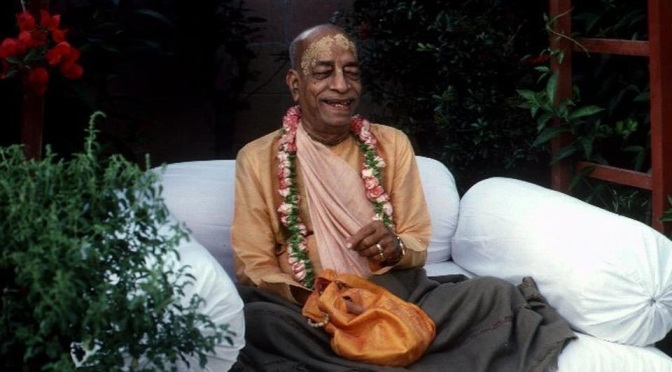Manah-sikshaTeachings to the Mind
(from Prarthana)
(1)
nitai-pada-kamala, koti-candra-susitala
je chayay jagata juray
heno nitai bine bhai, radha-krishna paite nai
dridha kori’ dharo nitair pay
(2)
se sambandha nahi ja’r, britha janma gelo ta’r
sei pasu boro duracar
nitai na bolilo mukhe, majilo samsara-sukhe
vidya-kule ki koribe tar
(3)
ahankare matta hoiya, nitai-pada pasariya
asatyere satya kori mani
nitaiyer koruna habe, braje radha-krishna pabe
dharo nitai-carana du’khani
(4)
nitaiyer carana satya, tahara sevaka nitya
nitai-pada sada koro asa
narottama boro dukhi, nitai more koro sukhi
rakho ranga-caranera pasa
Translation:
(1) The lotus feet of Lord Nityananda are a shelter where one will get the soothing moonlight not only of one,
but of millions of moons. If the world wants to have real peace, it should take shelter of Lord Nityananda.
Unless one takes shelter under the shade of the lotus feet of Lord Nityananda, it will be very difficult for him
to approach Radha-Krishna. If one actually wants to enter into the dancing party of Radha-Krishna, he must
firmly catch hold of the lotus feet of Lord Nityananda.
(2) Anyone who has not established his relationship with Nityananda Prabhu is understood to have spoiled
his valuable human birth. Such a human being is actually an uncontrollable animal. Because he never uttered
the holy name of Nityananda, he has become merged into so-called material happiness. What can his
useless education and family tradition do to help him?
(3) Being maddened after false prestige and identification with the body, one is thinking, nOh, what
is Nityananda? What can He do for me? I don’t care.î The result is that he is accepting something false to be
truth. If you actually want to approach the association of Radha-Krishna, you must first achieve the mercy of
Lord Nityananda. When He is merciful toward you, then you will be able to approach Radha-Krishna. Therefore
you should firmly grasp the lotus feet of Lord Nityananda.
(4) The lotus feet of Nityananda are not illusion; they are a fact. One who engages in the transcendental
loving service of Nityananda is also transcendental. Always try to catch the lotus feet of Lord Nityananda.
This Narottama dasa is very unhappy, therefore I am praying to Lord Nityananda to make me happy. My
dear Lord, please keep me close to Your lotus feet.
Purport
by His Divine Grace
A. C. Bhaktivedanta Swami Prabhupada
This is a very nice song sung by Narottama dasa Thakura. He advises that nitai-pada, the lotus feet of Lord Nityananda (kamala means “lotus,” and pada means “feet”), are a shelter where one will get the soothing moonlight not only of one, but of millions of moons. We can just imagine the aggregate total value of the soothing shine of millions of moons. In this material world (jagat), which is progressing toward hell, there is always a blazing fire, and everyone is struggling hard without finding peace; therefore, if the world wants to have real peace, it should take shelter under the lotus feet of Lord Nityananda, which are cooling like the shining of a million moons. Juraya means “relief.” If one actually wants relief from the struggle of existence and actually wants to extinguish the blazing fire of material pangs, Narottama dasa Thakura advises, “Please take shelter of Lord Nityananda.”
What will be the result of accepting the shelter of the lotus feet of Lord Nityananda? He says, heno nitai bine bhai: unless one takes shelter under the shade of the lotus feet of Lord Nityananda, radha-krishna paite nai—it will be very difficult for him to approach Radha-Krishna. The aim of this Krishna consciousness movement is to enable us to approach Radha-Krishna and associate with the Supreme Lord in His sublime pleasure dance. Narottama dasa Thakura advises that if one actually wants to enter into the dancing party of Radha- Krishna, he must accept the shelter of the lotus feet of Lord Nityananda. Then he says, se sambandha nahi Sambandha means “connection” or “contact.” Anyone who has not contacted a relationship with Nityananda is understood to have spoiled his human birth. In another song also, Narottama dasa says, hari hari bifale janama gonainu: anyone who does not approach Radha-Krishna through a relationship with Nityananda has uselessly spoiled his life. Britha means “useless,” janma means “life,” ta’r means “his,” and sambandha means “relationship.” Anyone who does not make a relationship with Nityananda is simply spoiling the boon of his human form of life. Why is he spoiling it? Sei pasu boro duracar.
Sei means “that,” pasu means “animal,” and duracar means “misbehaved” or “the most misbehaved.” Without elevation to Krishna consciousness through the mercy of Lord Caitanya and Nityananda, life is simply spoiled in the animal propensities of sense gratification. Narottama dasa says that ordinary animals can be tamed, but when a human being is animalistic, having only animal propensities, he is most horrible, for he cannot be tamed. Ordinary cats and dogs or even a tiger can be tamed, but when a human being goes out of his way and neglects to take to the human activity of Krishna consciousness, his higher intelligence will simply be misused for animal propensities, and it is very difficult to tame him. The enactment of state laws cannot make a thief an honest man—because his heart is polluted, he cannot be tamed. Every man sees that a person who commits criminal offenses is punished by the government, and also in scriptural injunctions punishment in hell is mentioned. But despite hearing from scripture and seeing the action of the state laws, the demoniac cannot be tamed. What are they doing? Nitai na bolilo mukhe. Since they do not know who Nityananda is, they never say the names of Lord Nityananda and Lord Caitanya.
Majilo samsara-sukhe. Majilo means “becomes absorbed.” They become absorbed in so-called material enjoyment. They don’t care who Lord Caitanya and Nityananda are, and therefore they go deep down into material existence. Vidya-kule ki koribe tar: if one has no connection with Nityananda, and if he does not come to Krishna consciousness, his vidya, or his so-called academic education, and kula, birth in a high family or great nation, will not protect him. Regardless of whether one is born in a very big family or nation or has a very advanced academic education, at the time of death nature’s law will act, his work will be finished, and he will get another body according to that work. Why are these human animals acting in this way? Ahankare matta hoiya, nitai-pada pasariya. They have become maddened by a false concept of bodily life, and thus they have forgotten their eternal relationship with Nityananda. Asatyere satya kori mani: such forgetful persons accept the illusory energy as factual. Asatyere refers to that which is not a fact, or, in other words, maya. Maya means that which has no existence but is a temporary illusion only. Persons who have no contact with Nityananda accept this illusory body as factual. Narottama dasa Thakura then says, nitaiyer koruna habe, braje radha-krishna pabe: “If you actually want to approach the association of Radha-Krishna, you must achieve the mercy of Lord Nityananda first. When He is merciful toward you, then you will be able to approach Radha-Krishna.” Dharo nitai-carana du’khani. Narottama dasa advises that one firmly catch the lotus feet of Lord Nityananda.
Then again he says, nitai-carana satya. One should not misunderstand and think that as he has caught hold of maya, similarly the lotus feet of Nityananda may also be something like that maya, or illusion. Therefore Narottama dasa confirms, nitai-carana satya: the lotus feet of Nityananda are not illusion; they are a fact. Tahara sevaka nitya: and one who engages in the transcendental loving service of Nityananda is also transcendental. If one engages in the transcendental loving service of Nityananda in Krishna consciousness, he immediately achieves his transcendental position on the spiritual platform, which is eternal and blissful. Therefore he advises, nitai-pada sada koro asa: always try to catch the lotus feet of Lord Nityananda.
Narottama boro dukhi. Narottama dasa Thakura, the acarya, is taking the position that he is very unhappy. Actually, he is representing ourselves. He says, “My dear Lord, I am very unhappy.” Nitai more koro sukhi: “Therefore I am praying to Lord Nityananda to make me happy.” Rakho ranga-caranera pasa: “Please keep me in a corner of Your lotus feet.”


